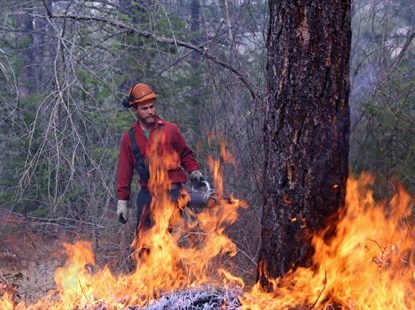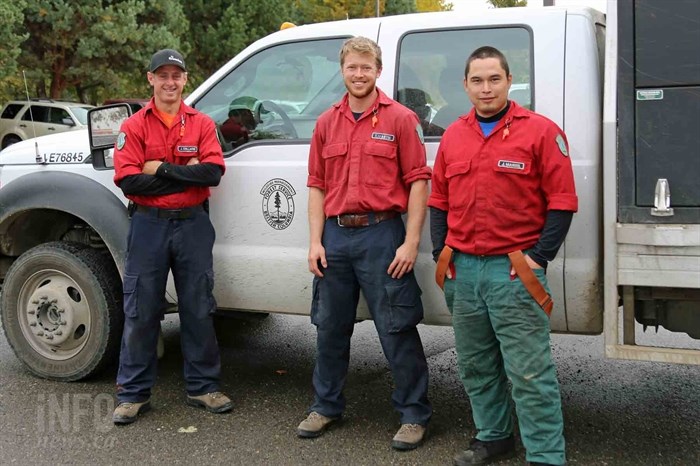
Wildland firefighters learn the ropes in the classroom and in the field through controlled burns and actual wild fires.
(JENNIFER STAHN / iNFOnews.ca)
October 28, 2014 - 8:09 AM
THOMPSON-OKANAGAN - It can feel like warfare; heading into a fire, in the middle of nowhere for days on end at the mercy of Mother Nature. Yet something about being on the battle lines draws in wildland firefighters season after season.
For Jarvis Manuel, a 14-year veteran with B.C. Wildfire, it’s the people. For Thomas Martin, a four-year veteran, it’s the people. Jon Collavini, a 17-year veteran, you guessed it, it’s the people.
These three men all come from very different backgrounds yet the job is one they keep coming back to despite the uncertainty and danger. They take pride in what they do and will spend hours on end training. Some years they can spend as little as 10 per cent of their time on an actual wildfire, but not recently. This year, crews jumped from one fire to another throughout the summer.
For Manuel, part of a 20-member crew out of Kamloops, he can spend a couple of weeks at a time at fire camps. For a man with a wife and three young kids at home, that can be tough but the seasonal work also allows him to be a stay-at-home dad during the winter, something he cherishes.
“You get to travel, I’m outside all the time. I’m gone all summer though, I spent four full two-week deployments plus a few little ones (this summer),” he says. “I didn’t see my family that often. I look forward to my time with them in the winter.”
Starting wage comes in just under $19 per hour on salary for 35 hours per week but higher rates for on-call and overtime pay top it up. Contracts run from four months for students to a minimum of eight months for more senior firefighters. The pay is enough for many to go to school or travel in the winter, though some will take another job.
Many of the men and woman who make up the Kamloops Fire Centre come from a sport-related background and Collavini says that passion and drive, the alpha-type personality, lends itself well to working in the team environment of firefighting.
“The way we hire, it’s people who want to work, want to push. They’re very committed to what they do. You get that mutual mentality of ‘we’re going to war together,’” he says. “It’s fairly simple (fighting fires), but it’s mental warfare, Mother Nature is fully in control.”
Collavini notes the group tends to be tight-knit because of how much they work together but it’s more than that.
“We all wear the red and blue. There’s a camaraderie,” he says. “I love watching young people on fires they’ve never experienced before. I get to relive the excitement through them. It reminds me of what got me hooked. It’s fresh."
ALL THINGS CONSIDERED
For some of the younger guys, like Martin and Ryan Sharp, a six-year veteran, the decision to come back every year is not made quickly, nor is it taken lightly.
“I’m year to year on it. I re-evaluate at the end of every season, because I have that freedom right now,” Sharp says. “I’m young, but I’m happy with what I’m doing right now.”
For Martin he knows he wants to be involved in the fire and forestry industry, it’s what he went to school for, but he’s not looking too far into the future just yet.
“Definitely I see myself involved in the fire world, but I’m taking it one year at a time. But I’ll probably be back next year, let’s be honest,” Martin says. “I keep coming back… it’s the people you work with. It’s an answer you hear all the time because it’s true.”
The hard workers, job experience and the requirement to work hard all the time are all positives for Martin.
“You get some awesome experiences and training, a lot of challenges and you’re forced to perform well, there’s not room for mediocracy. You can’t disappear into the noise,” he says. “It’s a fun job.”
While they all enjoy their jobs and the excitement that comes along with it, there are downfalls and things that give them pause before agreeing to return.
For Martin being away from family and friends can be hard. While he has made friends in Kamloops he comes from Vancouver and it can be near impossible to make it back for all the celebrations that take place, often in the summer. The lack of control over your schedule is a sacrifice many of his friends shy away from. Collavini also misses out on family activities.
“You have no life outside of (work),” he says. “You don’t really have a personal life.”
Manuel agrees the missed family celebrations are hard, though his kids’ birthdays all fall in the shoulder- or off-season. The work-life balance is difficult but he says his wife, who also works full time, helps keep things in check and her support is what allows him to continue doing a job he loves.
Even in the most stressful years though, such as 2003 when fires forced major evacuations throughout the Interior, the job has always been worth it.
“I’ve been in hell holes, but they’ve been some of my best experiences,” Collavini says. “Camp life was terrible, but the fire experience was great. Every year is an adventure.”
To contact a reporter for this story, email Jennifer Stahn at jstahn@infonews.ca or call 250-819-3723. To contact an editor, email mjones@infonews.ca or call 250-718-2724.

Jarvis Manuel, Thomas Martin and Jon Collavini wear their pride on their sleeves as wildland firefights with B.C. Wildfire.
(JENNIFER STAHN / iNFOnews.ca)
News from © iNFOnews, 2014